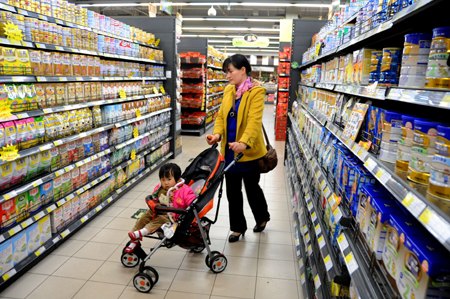Parents feel the pinch of tainted milk
- By Bai Ping
 0 Comment(s)
0 Comment(s) Print
Print E-mail China Daily, February 4, 2013
E-mail China Daily, February 4, 2013
 |
|
[Photo/CRIENGLISH.com ] |
Although I've been coping with the incessant stranglehold of smog on Beijing with considerable calm, recent reports of tainted milk from New Zealand have sent a chill down my spine, because if proved true, it might have also harmed my 4-year-old son.
As I write this article, Chinese consumers are still waiting for an official risk assessment report after traces of a potentially toxic chemical were found in milk produced by Fonterra Cooperative Group Ltd, the world's largest exporter of dairy products.
Like many sensitive parents, I'd not be easily placated by assurances that "very low levels" of dicyandiamide, or DCD, in food don't pose a risk after going through the shockwaves of the 2008 tainted milk scandal that killed six infants and left more than 300,000 children with various ailments in the mainland.
Fonterra owned a large stake in the now defunct Sanlu Group, which was at the center of the crisis.
I'd once considered my son to be lucky. Born amid a national crackdown on melamine-contaminated milk when many scared urban parents vowed to keep their children away from domestic brands, he has always been fed milk formula from reputable foreign companies.
Until my son turned 2 years old, I had flown every three months to Shenzhen to buy milk in adjacent Hong Kong. Since Chinese mainland customs allows you to bring in a maximum of six tins at a time, I had to make more than one trip across the border between the two cities during each visit.
I knew people like me hauling baby formula in bulging trolley bags attracted resentful stares on streets and in the subway, because such runs on sales of milk sometimes caused shortages in the local market.
Our demand for foreign brands has also spawned an army of dedicated "parallel traders", who make a living buying baby formula in Hong Kong and selling them on the mainland at higher prices.
But what can we do? No parents will allow their child to eat food they are not reasonably confident about.
Then the double whammy of earthquake and tsunami hit Japan, followed by radiation leaks from a nuclear plant. Although my son loved Japanese milk, I was forced to switch to a popular US brand, which I've been stocking whenever I visit Hong Kong or cities in Southeast Asia.
The sales of Fonterra products have reportedly dropped drastically in China because nervous parents are put off by possible damages of DCD residue. They've become more distraught after learning that the dairy giant also provides milk to other international brands, including the one used by my son.
Perhaps it's time to turn to domestic brands now that mighty foreign brands are also losing their shine and Chinese producers have learned their lessons, as some analysts suggest. Recent media reports also say that a string of officials at various levels, who were sacked for their roles in the Sanlu scandal, have been reinstated through various new appointments in the spirit of letting the bygones be bygones.
But it's difficult to change a consumer's attitude once it's formed. Suspicious parents still have low levels of trust in local brands, which have continued to be hit sporadically by tainted products.
Besides a tattered reputation for low quality, high production costs and scarce land supplies have also exacerbated the predicament of Chinese dairy product makers, who are keen to use foreign raw materials or simply produce in plants overseas as a way to win back consumers.
More Chinese parents will continue to buy foreign formula despite the Fonterra fiasco. When you are given only two choices, both bad, you choose the lesser evil.
I will continue to buy milk in Hong Kong and overseas until my son doesn't need it anymore. But the question is, which one I should trust this time.
The writer is editor-at-large of China Daily.






Go to Forum >>0 Comment(s)